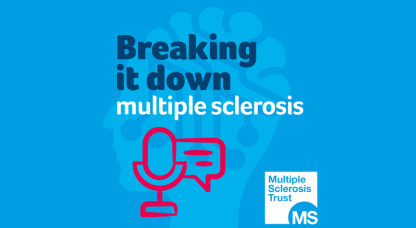Brain health refers to the ability to remember, learn, plan, concentrate and maintain a clear, active mind.
In MS, the immune system mistakenly attacks and damages tissue in the brain and spinal cord (the central nervous system). This results in lesions that can be seen on a MRI scan.
The brain can compensate for some of this damage by rerouting signals or adapting healthy areas of the brain to take on new functions. This capacity is known as ‘neurological reserve’ or ‘brain health’.
These inbuilt repair mechanisms can explain why disease activity may be invisible during the early stages of MS.
About half of all people with MS will have problems with aspects of thinking at some time, perhaps their memory, attention span or concentration. These symptoms are referred to as cognitive problems.
Taking steps to maximise brain health can help protect against cognitive decline, and can help people to maintain a good quality of life as they get older.
Traditionally, treatment for MS focused on preventing relapses, but little attention was paid to cognitive changes. In 2015, a report called 'Brain Health: Time Matters in Multiple Sclerosis' was published, setting out the reasons why MS care should include a focus on thinking and memory problems. Since then, the MS Brain Health organisation have been campaigning for this in countries around the world.
The campaign objectives are:
- To aim to start treatment soon after diagnosis.
- To set a goal for treatment to stop relapses but also to minimise any changes that can be seen on MRI scans.
- To encourage people with MS to adopt a "brain-healthy" lifestyle.
More neurologists now recognise that waiting for a relapse, or for physical symptoms to show, before prescribing a disease modifying drug means that people with MS may develop cognitive problems.Treating early after diagnosis with disease modifying drugs protects brain health and gives the best opportunity for maintaining your thinking and memory skills.
There are a number of things you can do to lead a ‘brain-healthy’ lifestyle. These include:
- Keeping as fit and active as you can through regular exercise
- Maintaining a healthy weight
- Keeping your mind active through reading, creative activities, or puzzles such as sodoku and crosswords
- Avoiding smoking
- Limiting how much alcohol you drink
- Continuing to take any other medicines that your doctor has prescribed
- Making sure that any other health conditions, such as diabetes or heart disease are well controlled.


